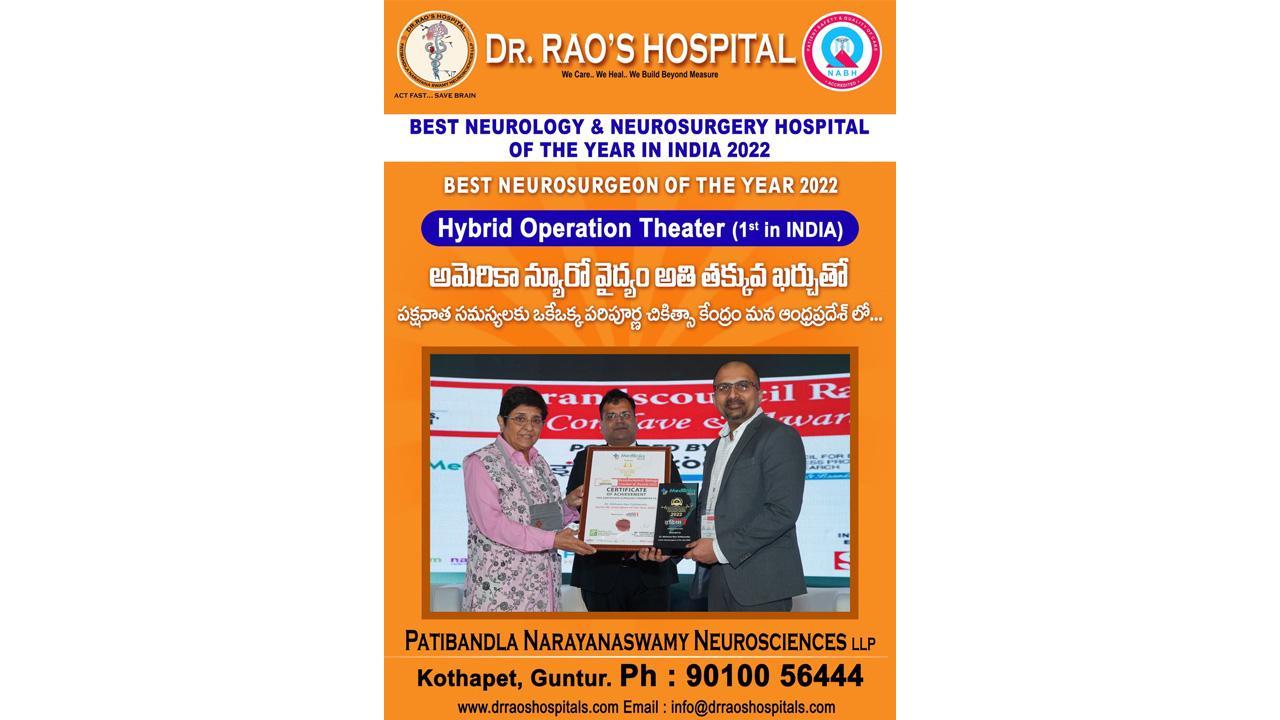Dr. Rao's Hospital, based in Guntur, Andhra Pradesh, offers result-oriented, minimally Invasive Neurosurgery procedures.

Dr. Rao's Hospital offers result oriented, Minimally Invasive best Neurosurgery and best spine surgery Keyhole procedures
Dr. Rao's Hospital, based in Guntur, Andhra Pradesh, offers result-oriented, minimally Invasive Neurosurgery procedures. The well-known Hospital has state-of-the-art technology and clinical support essential to neurosurgery and neuroscience treatment. It is also the first Hospital in India equipped with FDA-approved critical care equipment in the Neuro ICUs. It can provide all the neurosurgical treatments option under a single roof. Also, it is the second facility in India to Flat Panel Biplane Vascular Hybrid Cath Lab and Full Storz Endoscopic solution with 4K technology.
ADVERTISEMENT
The Hospital has a total solution of Stealth 8 Neuronavigation system, including Stealth DTI and FrameLink, intra-operative Xper dual CT, and intraoperative neuromonitoring for accuracy and precision in the Neurosurgical treatment. Dr. Rao's Hospital is the only Hospital in India equipped with all these facilities.
New-era neurosurgeons utilize minimally invasive neuro procedures to do almost every kind of neurosurgery. Minimally invasive neurosurgery, or Keyhole neurosurgery, as it is also referred to, uses an endoscope or microscope to view the interiors of the brain, spinal cord, and skull base. Lately, craniofacial neurosurgery, craniotomy, Endovascular Neurosurgery, Epilepsy, Image-guided surgery, and Cerebrovascular neurosurgery all are transforming into minimally invasive procedures across the world and are available at Dr. Rao's Hospital.
Prominent Neurosurgeons such as Dr. Mohana Rao Patibandla at Dr. Rao's Hospital in Guntur, Andhra Pradesh, state, "Minimally invasive surgeries have revolutionized neurosurgery. Currently, neurosurgeons are in a position to offer promising treatment of life-threatening brain and spinal ailments and restore hope and faith in the patients and their family members." Speaking highly of the immense benefits of these surgeries, Dr. Rao says, "I have performed intracranial surgeries, endonasal surgeries, and even spinal surgeries using the minimally invasive procedure, and the patients have fully recovered with their discharge happening the next day or in a couple of days."
Dr. Mohana Rao Patibandla, an eminent neurosurgeon in Guntur, is exceptionally skilled in minimally invasive neurosurgery. Indian Neurosurgery recognized him for his versatile experience and his minimally invasive neurosurgery procedures.
Recently, Topnotch Foundation recognized his contribution to healthcare, and he was felicitated at the Topnotch Foundation International Business / Education / Healthcare and Women Pride Awards 2022.
The endoscope is a small, flexible, lighted tube inserted in the surgical area through small incisions. The endoscope serves as a tiny microscope that enlarges the critical structures enabling the surgeon to remove the diseased organ or foreign body or repair or replace it as essential.
Also, the neurosurgeon can navigate the endoscope and other surgical instruments and access hard-to-reach locations that could be inaccessible by the human hand. The neurosurgeon can complete resection of the tumor or affected tissue, reducing the need for seeking allied treatment required by brain cancer patients.
There are multiple benefits associated with a minimally invasive neurosurgery procedure, such as less blood loss, less muscle damage, less infection, postoperative trauma, and less pain-relieving medicine required after trauma.
Through a minimally invasive procedure, removing a brain tumor or brain clot is possible through small incisions and with precision accompanied by minimal blood loss. On the other hand, open surgery would require a large incision of the skull or the scalp and deep within the brain tissue, meaning more blood loss and more scarring accompanied by a more extended recovery period.
Over the years, minimally invasive neurosurgeries have had better and more effective outcomes than similar conventional open surgeries. Hence, most neurosurgeons recommend these procedures rather than going ahead with open surgery.
 Subscribe today by clicking the link and stay updated with the latest news!" Click here!
Subscribe today by clicking the link and stay updated with the latest news!" Click here!







